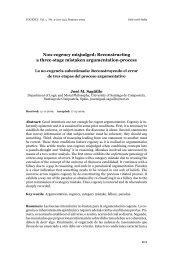Cogency v2 n2
Cogency v2 n2
Cogency v2 n2
You also want an ePaper? Increase the reach of your titles
YUMPU automatically turns print PDFs into web optimized ePapers that Google loves.
Dialogue-in-process. Review of Frans H. van Eemeren and... / S. GRECO MORASSO<br />
2005: 3). Rather, it concerns the reasonableness of persuasion in general<br />
and of personal acceptance of given starting points in particular. As van<br />
Eemeren and Grootendorst (2004) remind us, there is no point in starting a<br />
critical discussion if the participants have no substantial zone of agreement.<br />
If we could not reasonably accept premises, we could not argue at all. On<br />
the other hand, finding shared premises with our co-arguers is often a delicate<br />
task.<br />
Going back to the specific contents of Gough’s paper, I would like to<br />
quote an example of the type of question he raises vis à vis Freeman’s account.<br />
He criticizes the idea of a “human constitution” or “moral conscience”<br />
grounding our common sense beliefs, proposed by Freeman (see Gough’s<br />
synthesis on pp. 254-255). More specifically, Gough (p. 255) challenges the<br />
idea that we recognize the intrinsic value or dignity of persons; in other<br />
words, that human beings must be perceived as ends rather than means<br />
(Freeman 2005: 240 and ff.). Now, the problems that Gough identifies are<br />
still partially unsolved (as he observes himself). For example, if we were to<br />
replace the criterion of a human constitution with the idea that “shared intuitions,<br />
common value beliefs, and interpretations […] need to be negotiated<br />
through considered argumentation” (p. 264), then it would still not be<br />
clear at what point and why this process of negotiation could reasonably<br />
end. When shall we really accept the results of our negotiations as satisfying?<br />
Gough’s contribution and more generally the vein of reflection on acceptability<br />
brings out fundamental questions for current argumentation<br />
studies.<br />
7. Open issues<br />
Let us look at some of the points on which authors (implicitly or explicitly)<br />
disagree, in order to present questions for further discussion.<br />
In the previous section, I have shown that Gough’s chapter (18) leaves<br />
many open questions about the problem of premise acceptability. In section<br />
5, I also highlighted how research on argumentation could arguably<br />
benefit from consideration of a broader set of contexts. I would like to make<br />
two further points.<br />
First, different authors included in the section on argument structures<br />
189








